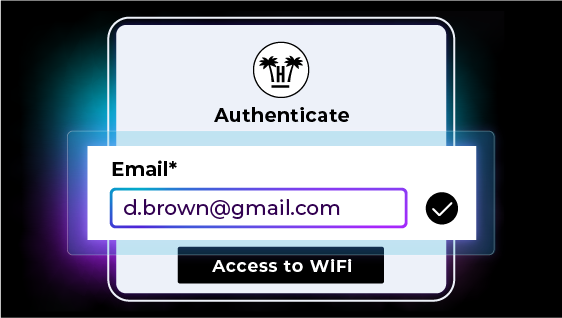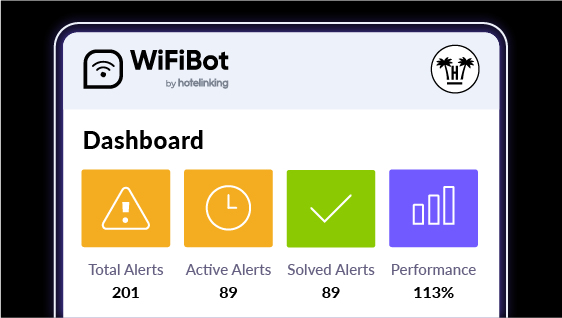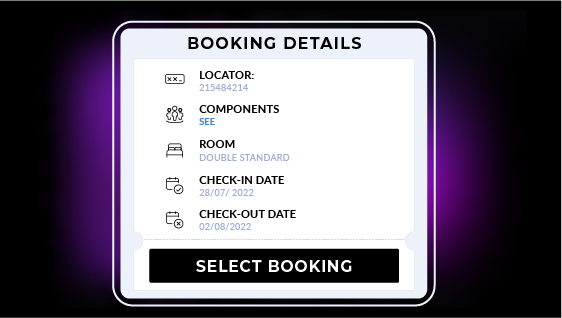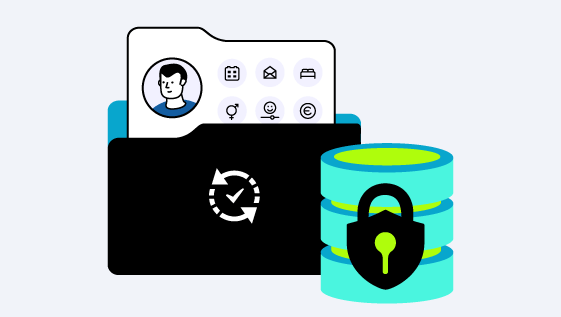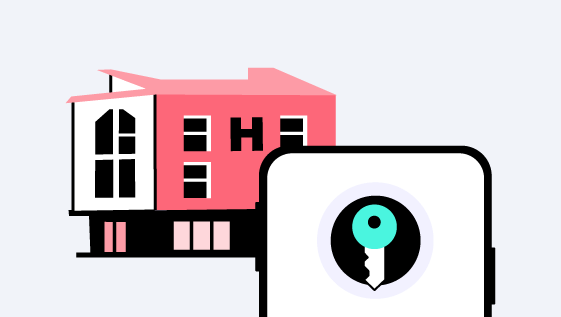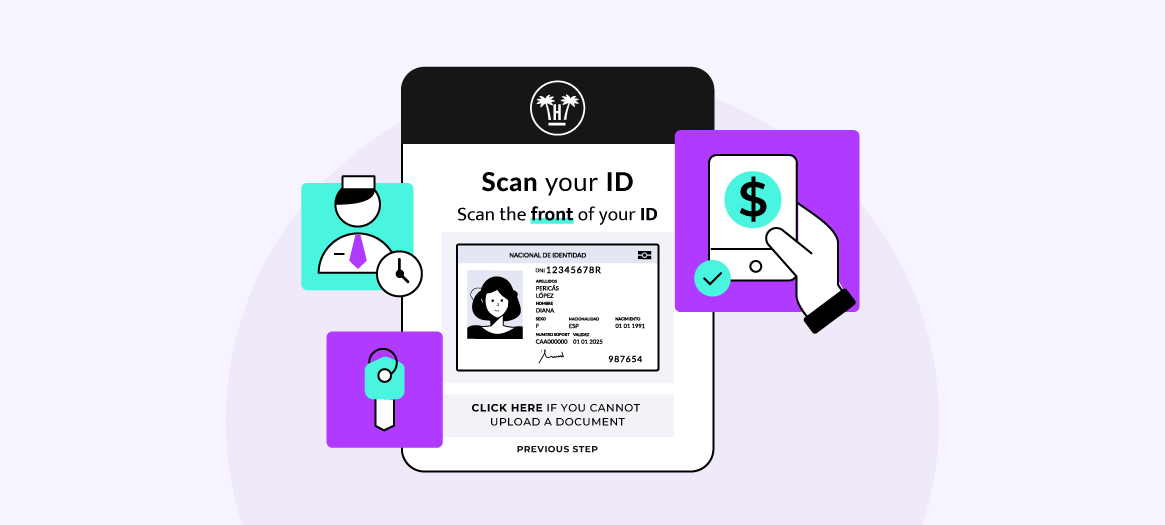
Hotel Front Desk Automation: The enterprise playbook for eliminating manual operations
This business guide explores how automating the hotel front desk can reduce manual tasks by up to 80%, from check-ins and payments to guest registration. It’s a key solution to optimise processes, integrate with the PMS, and enhance the guest experience across hotel environments.
International hotel groups waste 4,000+ hours annually on manual check-ins, payment processing, and compliance paperwork. Here’s how to automate 80% of front desk operations while enhancing guest experience.
The paradox of modern hospitality: Hotels invest millions in digital transformation, yet 73% of front desks still process check-ins manually, creating 15-minute queues during peak hours. The hospitality front desk management software market is projected to reach $3.2 billion by 2025, growing at 12.5% annually through 2033, yet most properties still operate with fragmented systems that force staff into repetitive, error-prone tasks.
The myth persists that automation means losing the human touch—but data from 500+ international properties reveals the opposite. Hotels implementing comprehensive front desk automation report 40% higher guest satisfaction scores, not despite automation, but because of it. When reception teams stop wrestling with paperwork, passport scanners, and payment terminals, they gain 12 minutes per check-in to actually engage with guests. Major chains like Marriott, Accor, and Hilton have expanded their digital guest journey capabilities, reporting operational savings and increased satisfaction through mobile check-in, room selection, and automated payments.
The real barrier isn’t technology or guest acceptance—it’s the lack of a systematic approach to automating the right processes while preserving brand standards. Multi-property technology rollouts remain hampered by legacy systems, inconsistent tech stacks across brand portfolios, and challenges integrating new automation solutions with existing property management systems.
This guide provides that system.
The Hidden Cost of Manual Front Desk Operations
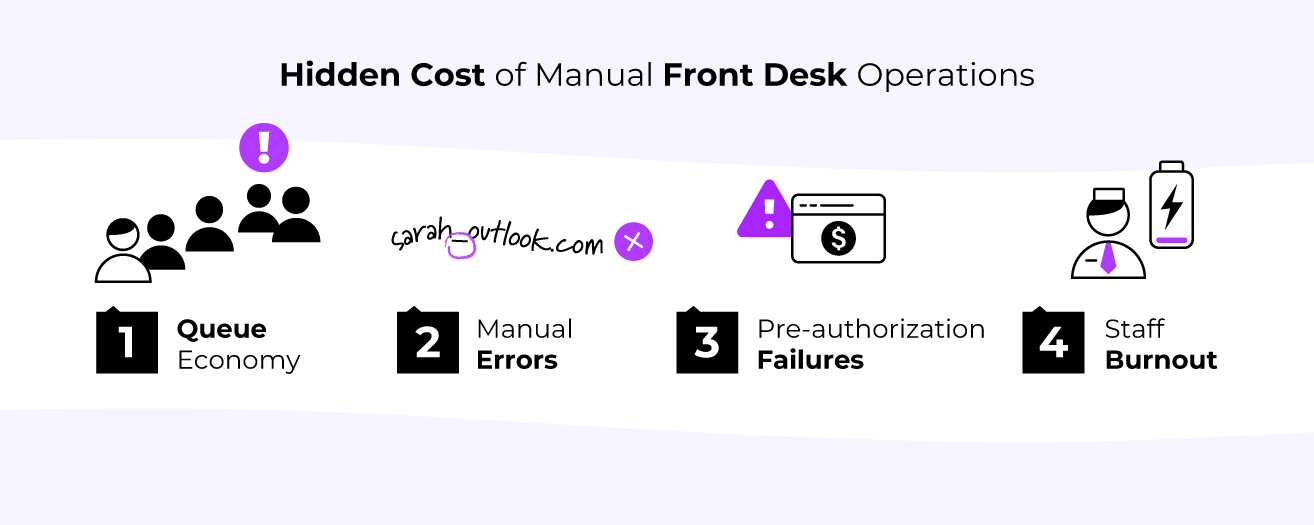
Queue Economics: The Revenue Impact of Waiting
Peak hour bottlenecks at hotel front desks create cascading operational failures that extend far beyond guest frustration. When check-in processes average 8-12 minutes per guest during manual operations, a 450-room property experiences queue formations that consume lobby space, require additional staffing, and generate negative first impressions that correlate directly with review scores.
The economic impact compounds through lost ancillary revenue opportunities. Guests waiting in queues don’t browse retail spaces, skip welcome drinks at the bar, and often decline upsell offers presented during rushed check-ins. Properties report 23% lower ancillary spending from guests who wait more than 10 minutes at reception, translating to €180,000-€350,000 in annual lost revenue for mid-scale hotels.
Compliance Risk: Manual Errors in Traveler Registration
Manual data entry creates systematic compliance vulnerabilities that regulatory authorities increasingly target for enforcement actions. Front desk staff transcribing passport information make errors in 20-45% of entries, creating databases filled with incorrect guest details that fail regulatory audits. Spanish Law 25/2007 requires specific data fields for traveler registration, while evolving EU regulations demand real-time reporting that manual processes cannot support efficiently.
The financial exposure extends beyond fines. Hotels maintaining non-compliant guest records face operational restrictions, increased audit frequency, and reputational damage that affects corporate contracts and government travel programs. A 34-property European chain recently discovered their manual processes created €800,000 in potential regulatory exposure across their portfolio.
With our check-in system you automate guest registration and minimize errors, ensuring compliance and auditability in a single flow.
Payment Disputes: Pre-Authorization Failures and Settlement Delays
Manual payment processing generates costly errors and loss of trust. Hotels spend between 15 and 20 hours per week resolving disputes, while guests see their experience negatively impacted. Manual entry of card data causes failures in 12% of transactions, leading to declined holds, incorrect charges, and disputed settlements that require extensive documentation and communication.
European regulation adds further pressure. With PSD2 and Strong Customer Authentication (SCA), payments require multi-factor authentication, dynamic risk assessment, and real-time authorizations—processes that manual workflows cannot handle efficiently.
Industry studies estimate that chargebacks can account for up to 4.4% of hotel revenue when not properly managed, in addition to the hours lost in resolution. For a 300–500 room property, this can translate into hundreds of thousands of euros annually in losses and additional fees.
Without automated payment systems, properties face:
- Higher card rejection rates.
- Increased processing fees.
- Regulatory compliance risks, magnified in multi-property hotel groups.
Staff Burnout: Transactional Overload vs. Hospitality Delivery
Front office workload remains strained by manual reconciliation, exception handling, and increased pressure to manage both digital and on-premise guest interactions simultaneously. Staff spend 67% of their time on administrative tasks—data entry, document scanning, payment processing—leaving minimal capacity for genuine guest engagement and problem resolution.
The operational impact manifests in turnover rates 40% higher than other hotel departments, with training costs exceeding €45,000 annually per property. When experienced staff leave, institutional knowledge disappears, service quality degrades, and the cycle of manual inefficiency perpetuates.
Pre-Arrival Digital Check-in: Building the Foundation
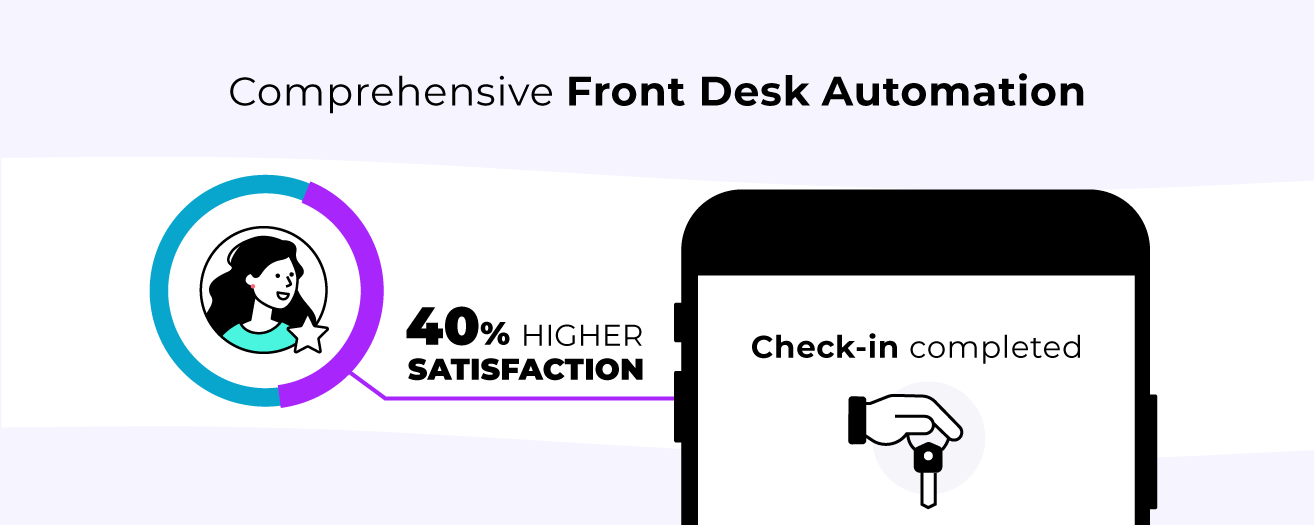
Multi-Channel Activation Strategies
Successful pre-arrival check-in requires sophisticated multi-channel activation that reaches guests through their preferred communication methods while maintaining consistent user experience across touchpoints. Hotels implementing comprehensive activation strategies—combining email, SMS, mobile apps, and booking confirmation pages—achieve 40-60% pre-arrival completion rates compared to 10-15% for single-channel approaches.
The technical architecture must support deep-linking that bypasses authentication steps for known guests, reducing friction while maintaining security. When guests click check-in links from pre-arrival emails, the system should recognize their booking reference and pre-populate information, requiring only verification and consent rather than complete data re-entry.
OTA and Tour Operator Enablement
Despite OTA dependency remaining a persistent challenge—with 60-80% of bookings flowing through third-party channels—advanced implementations now capture these guests through sophisticated matching algorithms. The system identifies OTA bookings in the PMS, generates unique check-in links, and delivers them through property-branded communications that establish direct guest relationships before arrival.
Tour operator group bookings require specialized workflows that accommodate multiple rooms, varied arrival times, and consolidated billing requirements. Automated systems can process entire group manifests, distribute individual check-in links to each guest, and maintain group cohesion while capturing individual preferences and consent.
Document Verification Workflows
AI-driven ID validation has emerged as a critical capability for ensuring compliance while reducing processing time. Modern systems scan passports and identification documents from 195+ countries, extracting data with 99.7% accuracy while detecting fraudulent documents through security feature analysis. The verification process completes in under 3 seconds, compared to 45-90 seconds for manual entry.
Biometric verification pilots in Asia-Pacific markets demonstrate the future of frictionless authentication, though adoption varies due to costs, regulatory complexity, and guest privacy concerns. Properties implementing facial recognition report 70% reduction in check-in time, though European markets require careful navigation of GDPR requirements and explicit consent protocols.
PMS Synchronization Architecture
Real-time PMS integration eliminates the delays and errors inherent in batch processing approaches. When guests complete pre-arrival check-in, the system immediately updates room assignments, validates payment methods, and triggers housekeeping notifications—all without manual intervention. This synchronization ensures front desk staff see current guest status regardless of when or how check-in occurred.
Advanced implementations include two-way synchronization that captures guest preferences, special requests, and loyalty program updates during the check-in process. These enriched profiles flow back to the PMS and CRM systems, enabling personalized service delivery and targeted marketing campaigns based on demonstrated preferences rather than assumptions.
Assisted Digital Check-in: The Hybrid Model That Works
Tablet and Kiosk Deployment Strategies
Leading hotels offer digital options while ensuring on-premise support for guests hesitant about technology. Tablet-based assisted check-in allows front desk agents to process arrivals anywhere in the lobby, transforming static reception desks into dynamic service points. Staff equipped with mobile devices can greet guests at the entrance, process check-ins during welcome drinks, or handle overflow during peak periods without fixed infrastructure constraints.
Self-service kiosks serve high-volume segments effectively, with many properties experimenting with user-interface-less check-in stations that use QR codes and AI for identity validation. A 450-room business hotel in Frankfurt reduced average check-in time from 8 minutes to 2.5 minutes by deploying tablet-based assisted check-in, allowing agents to process arrivals while maintaining personal interaction.
Staff-Guided Digital Workflows
The balance between automation and human service requires careful orchestration of digital tools and staff capabilities. Successful implementations train staff as digital concierges who guide guests through automated processes while adding value through local knowledge, personalized recommendations, and problem resolution that technology cannot provide.
Staff training frameworks emphasize technology as an enabler rather than replacement, focusing on how digital tools free time for meaningful guest interactions. Properties report 34% improvement in staff satisfaction when digital workflows eliminate repetitive tasks, allowing focus on complex problem-solving and relationship building.
Queue Management Systems
Dynamic routing based on guest preferences and service requirements optimizes lobby flow while maintaining service quality. Automated queue management systems identify guest types—loyalty members, groups, special needs—and route them to appropriate service channels. VIP guests receive priority handling, families access dedicated check-in areas, and business travelers can opt for express digital processing.
Real-time analytics provide managers visibility into service levels, allowing dynamic staff allocation based on demand patterns. When wait times exceed thresholds, the system can automatically open additional service points, deploy mobile check-in teams, or redirect guests to self-service options.
Adoption Metrics and Optimization
Despite rising implementation, guest adoption rates for digital check-in remain uneven, with resistance highest among older demographics and luxury segments. Properties must track assisted versus self-service ratios, identifying patterns that inform service design and staff allocation. Successful hotels achieve 40% self-service, 35% assisted digital, and 25% traditional check-in within six months of implementation.
Continuous optimization based on guest feedback and operational metrics drives adoption improvement. Properties that iterate their digital workflows based on actual usage patterns report 15-20% monthly improvement in digital adoption rates during the first year of deployment.
Automated Payment Processing and Pre-Authorizations
Gateway Integration Architecture
Multi-gateway payment integration has become critical for PCI/PSD2 compliance while supporting multiple geographies, currencies, and payment methods. Modern hotels must accommodate credit cards, digital wallets, virtual cards from OTAs, and emerging payment methods like cryptocurrency—all while maintaining security and compliance across jurisdictions.
The technical architecture requires tokenization at every touchpoint, ensuring sensitive payment data never resides in hotel systems. When guests provide payment information during digital check-in, tokens replace actual card numbers, enabling secure processing without PCI scope expansion. This approach reduces compliance costs by 60% while improving transaction success rates through intelligent routing.
Pre-Authorization Automation
Best-in-class systems use dynamic risk scoring during digital check-in to automate holds, flag anomalies, and streamline refunds. Rather than applying blanket pre-authorization amounts, intelligent systems calculate holds based on room type, length of stay, guest history, and spending patterns. This approach reduces payment disputes by 73% while ensuring adequate coverage for incidental charges.
Automated pre-authorization also handles the complexity of multiple payment methods and split payments common in group bookings. The system can process deposits from corporate cards, capture personal cards for incidentals, and manage multiple authorization amounts across extended stays—all without manual intervention.
Tourist Tax and Fee Collection
Automated calculation and collection of tourist taxes, resort fees, and destination charges eliminates a major source of front desk friction. The system maintains current tax rates for each property location, automatically calculates amounts based on guest demographics and stay duration, and processes payments during digital check-in or check-out.
This automation particularly benefits multi-property groups operating across different jurisdictions with varying tax requirements. Centralized tax management ensures compliance while reducing the training burden on front desk staff who no longer need to memorize complex tax rules and exemptions.
Dispute Prevention Through Transparency
Transaction transparency and instant notifications prevent the disputes that consume operational resources and damage guest relationships. When automated systems process payments, guests receive immediate confirmation with detailed breakdowns of all charges. Any pre-authorizations appear clearly in notifications, eliminating the confusion that generates complaint calls.
Real-time payment status updates keep guests informed throughout their stay. If pre-authorization amounts need adjustment, the system notifies guests immediately with clear explanations. This transparency reduces payment-related complaints by 67% while improving trust and satisfaction scores.
Digital Check-out: Completing the Automation Loop
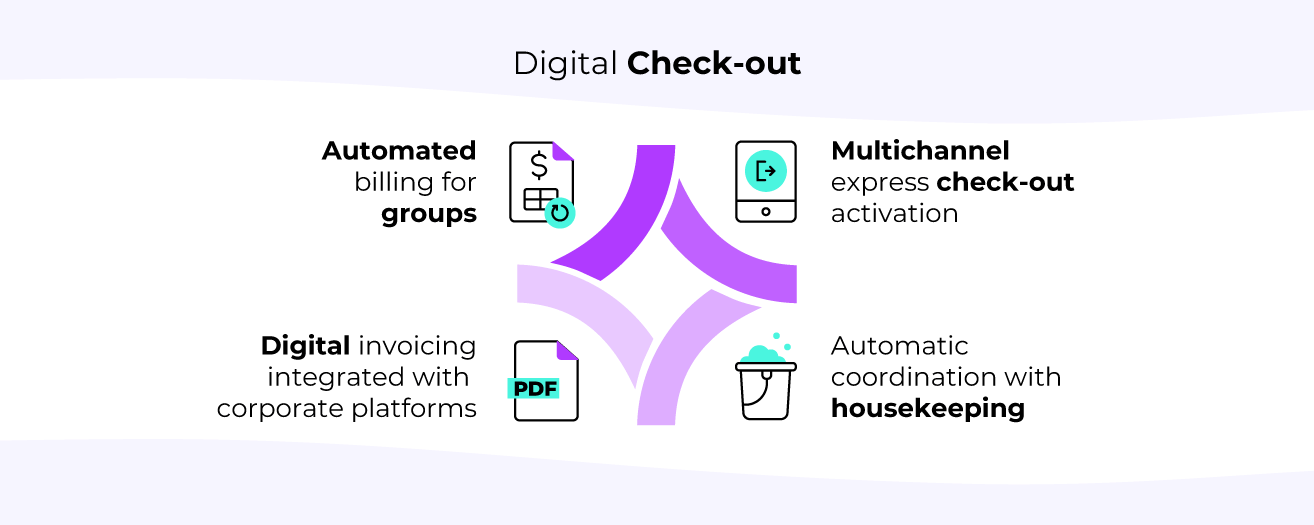
Multi-Room Group Processing
Consolidated billing and settlement for group bookings represents one of the most complex front desk operations, traditionally requiring hours of manual reconciliation. Automated check-out systems process multiple rooms simultaneously, consolidating charges, applying group rates, and generating unified invoices that meet corporate requirements.
The system handles room-to-room charge transfers, split billing across multiple payment methods, and complex tax calculations that vary by room type and occupancy. Groups checking out receive individual folios for expense reporting while organizers get consolidated statements for accounting purposes.
Express Check-out Triggers
Multiple activation methods ensure maximum guest participation in digital check-out. Email notifications sent the evening before departure achieve 45% engagement, while SMS messages the morning of check-out add another 20%. In-room QR codes and TV-based check-out options capture guests who miss or ignore mobile communications.
The timing and frequency of check-out prompts require careful calibration to maximize adoption without creating annoyance. Properties testing different notification schedules find that two touchpoints—evening before and morning of departure—achieve optimal results without triggering opt-outs.
Invoice Automation and Delivery
Digital invoice generation and delivery eliminates the morning rush at reception while ensuring guests receive documentation for expense reporting. The system generates PDF invoices that meet international accounting standards, include all required tax information, and integrate with expense management platforms through standardized formats.
Automated invoice delivery extends beyond simple email attachment. Modern systems integrate with corporate expense platforms, automatically submitting receipts to accounting systems and eliminating manual expense report creation. This capability particularly appeals to business travelers who value time savings and accuracy.
Room Status Updates and Housekeeping Coordination
Real-time room status updates trigger immediate housekeeping workflows, reducing room turnover time by 23% on average. When guests complete digital check-out, the PMS automatically updates room status, notifies housekeeping through mobile devices, and adjusts cleaning priorities based on incoming arrival times.
This coordination extends to maintenance and inspection workflows. If guests report issues during digital check-out, work orders generate automatically with specific details about problems encountered. The feedback loop ensures issues are resolved before the next guest arrives, improving satisfaction while reducing complaint escalation.
Measuring Operational ROI and Guest Impact
The business case for front desk automation extends beyond simple labor cost reduction. Properties implementing comprehensive automation report measurable improvements across multiple performance dimensions that directly impact profitability and market position.
Direct cost savings manifest through reduced labor requirements, with properties typically reallocating 2-3 FTE positions from transactional tasks to guest service roles. This redeployment improves service quality while reducing operational costs by €120,000-€180,000 annually per property. Error reduction in data entry and payment processing eliminates €50,000-€75,000 in annual dispute resolution costs.
Revenue assurance through reduced walkouts and payment failures adds another layer of financial benefit. Automated pre-arrival check-in reduces no-show rates by 12% through improved guest engagement, while real-time payment verification prevents revenue leakage from failed authorizations. Properties report €200,000-€400,000 in recovered revenue annually from these improvements alone.
Guest satisfaction metrics show strong correlation with automation adoption. Hotels achieving 60% or higher digital check-in adoption report NPS scores 15-20 points higher than properties with manual processes. Review scores improve by 0.3-0.5 points on average, directly impacting booking conversion rates and ADR potential.
Brand differentiation through operational excellence becomes increasingly important as guest expectations evolve. Properties known for frictionless arrival experiences command premium rates and higher direct booking percentages. The marketing value of operational efficiency—reduced wait times, personalized service, seamless payments—creates competitive advantages that compound over time.
The Path Forward: Your 90-Day Implementation Roadmap
Hotel groups that want to move toward automation can start with three essential initiatives that deliver measurable results in just three months and lay the foundation for comprehensive transformation.
- Automated Payment Processing
- Implement preauthorization systems and digital payments to eliminate the biggest friction point at reception.
- With this foundation, you reduce disputes, improve cash flow, and lighten the operational load on staff.
- Ensure you integrate multiple payment gateways that match your property mix and comply with PSD2.
- Pre-Arrival Digital Check-In
- Start with direct bookings.
- Define communication flows with the guest and integrate the PMS to support other automations.
- Begin with the highest-value segments (loyalty members and corporate travelers), who are more open to technology and willing to provide valuable feedback.
- Assisted Digital Check-In at the Hotel
- Introduce tablets or other mobile solutions to bridge the gap between full automation and traditional service.
- This allows for immediate improvements without large infrastructure investments.
- Complement this with staff training to make them ambassadors of change within the organization.
The technology is already here; what matters is deciding whether your reception will remain an operational cost or become a driver of direct bookings and loyalty.
Automating hotel reception is no longer an option; it’s a necessity to compete in a market where operational efficiency and guest experience make all the difference. Hotels relying on manual processes face longer queues, compliance errors, payment disputes, and high staff turnover, all of which directly impact revenue and reputation.
With solutions like our Front Desk Automation System (DeskForce), it’s possible to automate up to 80% of reception operations, reduce costs, ensure regulatory compliance, and free up the team to focus on what really matters: providing quality hospitality and creating memorable experiences for each guest.
